Political Science: Discussion on Democracy vs. Capitalism Tension
VerifiedAdded on 2020/04/13
|5
|1392
|35
Discussion Board Post
AI Summary
This discussion post examines the inherent tension between democracy and capitalism, highlighting their contrasting ideologies and societal impacts. The author defines democracy as a system where power resides with the people, directly or through representation, while capitalism prioritizes private sector control over economic and political systems. The post explores how these differences lead to conflict, particularly concerning economic rights and wealth inequality, using the Occupy Wall Street movement as a key example. It analyzes how democratic principles often clash with capitalist interests, leading to political corruption and corporate influence. The author argues that the tension results in divisions, where supporters of democracy advocate for the common good, while capitalists prioritize their own gains. The post concludes by emphasizing the importance of addressing these tensions to ensure social and economic justice.
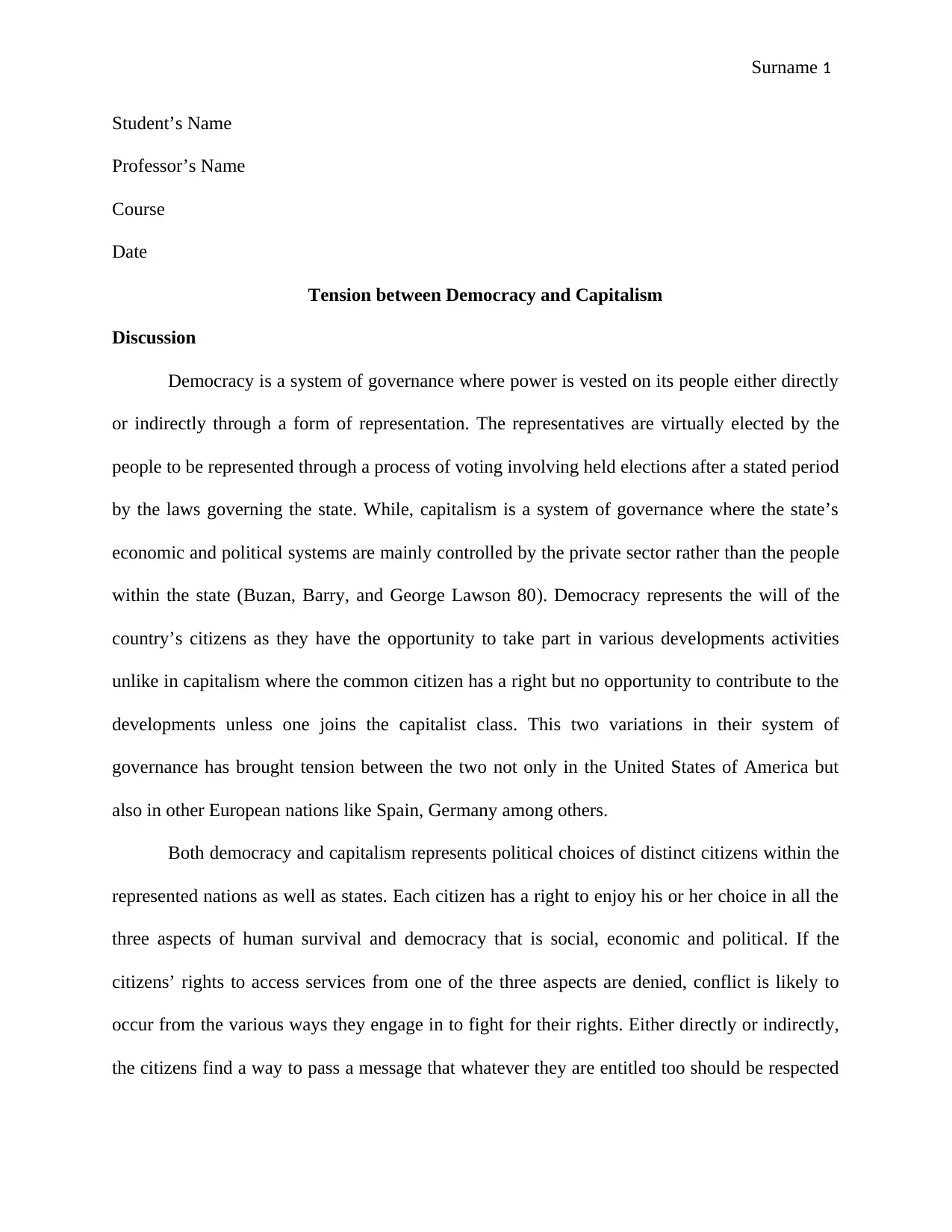
Surname 1
Student’s Name
Professor’s Name
Course
Date
Tension between Democracy and Capitalism
Discussion
Democracy is a system of governance where power is vested on its people either directly
or indirectly through a form of representation. The representatives are virtually elected by the
people to be represented through a process of voting involving held elections after a stated period
by the laws governing the state. While, capitalism is a system of governance where the state’s
economic and political systems are mainly controlled by the private sector rather than the people
within the state (Buzan, Barry, and George Lawson 80). Democracy represents the will of the
country’s citizens as they have the opportunity to take part in various developments activities
unlike in capitalism where the common citizen has a right but no opportunity to contribute to the
developments unless one joins the capitalist class. This two variations in their system of
governance has brought tension between the two not only in the United States of America but
also in other European nations like Spain, Germany among others.
Both democracy and capitalism represents political choices of distinct citizens within the
represented nations as well as states. Each citizen has a right to enjoy his or her choice in all the
three aspects of human survival and democracy that is social, economic and political. If the
citizens’ rights to access services from one of the three aspects are denied, conflict is likely to
occur from the various ways they engage in to fight for their rights. Either directly or indirectly,
the citizens find a way to pass a message that whatever they are entitled too should be respected
Student’s Name
Professor’s Name
Course
Date
Tension between Democracy and Capitalism
Discussion
Democracy is a system of governance where power is vested on its people either directly
or indirectly through a form of representation. The representatives are virtually elected by the
people to be represented through a process of voting involving held elections after a stated period
by the laws governing the state. While, capitalism is a system of governance where the state’s
economic and political systems are mainly controlled by the private sector rather than the people
within the state (Buzan, Barry, and George Lawson 80). Democracy represents the will of the
country’s citizens as they have the opportunity to take part in various developments activities
unlike in capitalism where the common citizen has a right but no opportunity to contribute to the
developments unless one joins the capitalist class. This two variations in their system of
governance has brought tension between the two not only in the United States of America but
also in other European nations like Spain, Germany among others.
Both democracy and capitalism represents political choices of distinct citizens within the
represented nations as well as states. Each citizen has a right to enjoy his or her choice in all the
three aspects of human survival and democracy that is social, economic and political. If the
citizens’ rights to access services from one of the three aspects are denied, conflict is likely to
occur from the various ways they engage in to fight for their rights. Either directly or indirectly,
the citizens find a way to pass a message that whatever they are entitled too should be respected
Paraphrase This Document
Need a fresh take? Get an instant paraphrase of this document with our AI Paraphraser
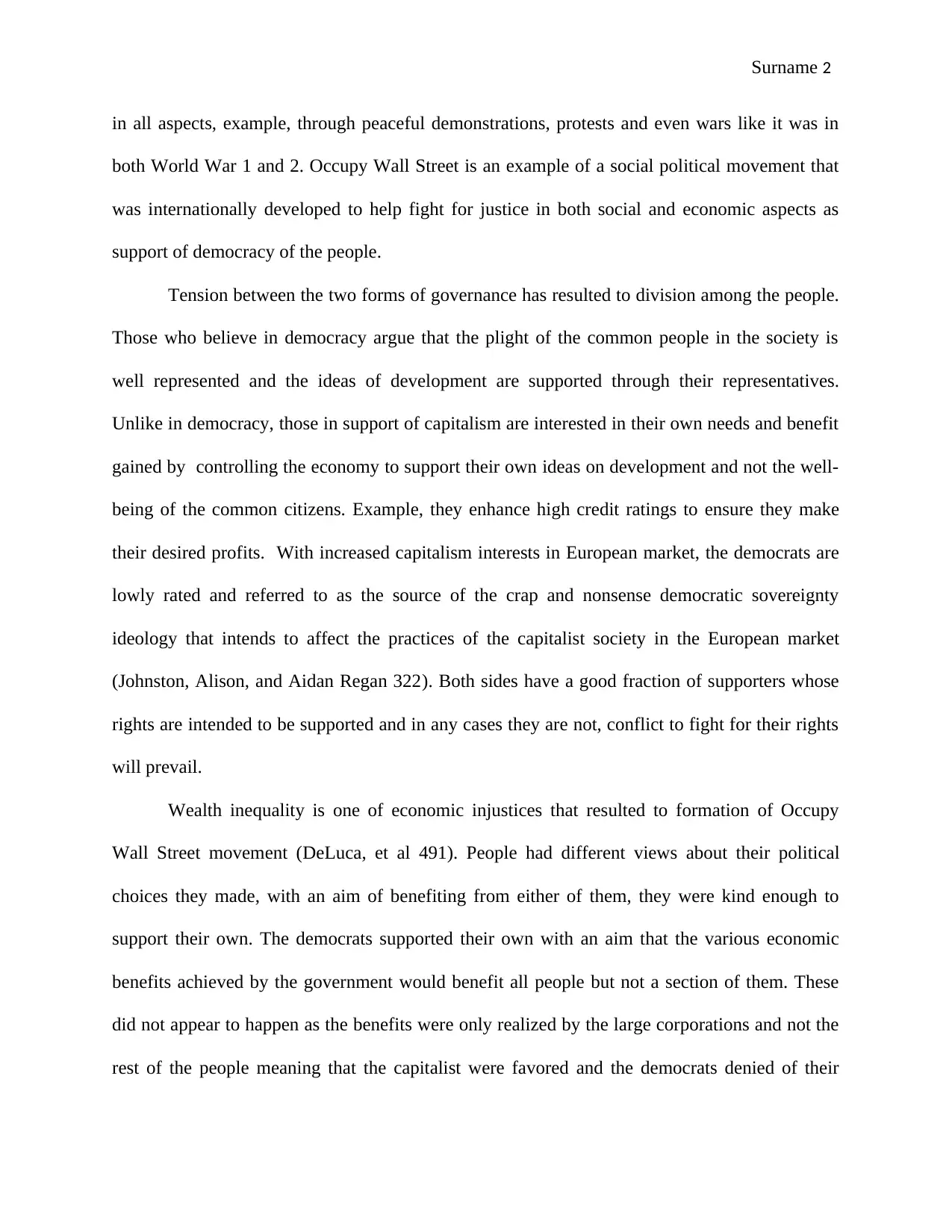
Surname 2
in all aspects, example, through peaceful demonstrations, protests and even wars like it was in
both World War 1 and 2. Occupy Wall Street is an example of a social political movement that
was internationally developed to help fight for justice in both social and economic aspects as
support of democracy of the people.
Tension between the two forms of governance has resulted to division among the people.
Those who believe in democracy argue that the plight of the common people in the society is
well represented and the ideas of development are supported through their representatives.
Unlike in democracy, those in support of capitalism are interested in their own needs and benefit
gained by controlling the economy to support their own ideas on development and not the well-
being of the common citizens. Example, they enhance high credit ratings to ensure they make
their desired profits. With increased capitalism interests in European market, the democrats are
lowly rated and referred to as the source of the crap and nonsense democratic sovereignty
ideology that intends to affect the practices of the capitalist society in the European market
(Johnston, Alison, and Aidan Regan 322). Both sides have a good fraction of supporters whose
rights are intended to be supported and in any cases they are not, conflict to fight for their rights
will prevail.
Wealth inequality is one of economic injustices that resulted to formation of Occupy
Wall Street movement (DeLuca, et al 491). People had different views about their political
choices they made, with an aim of benefiting from either of them, they were kind enough to
support their own. The democrats supported their own with an aim that the various economic
benefits achieved by the government would benefit all people but not a section of them. These
did not appear to happen as the benefits were only realized by the large corporations and not the
rest of the people meaning that the capitalist were favored and the democrats denied of their
in all aspects, example, through peaceful demonstrations, protests and even wars like it was in
both World War 1 and 2. Occupy Wall Street is an example of a social political movement that
was internationally developed to help fight for justice in both social and economic aspects as
support of democracy of the people.
Tension between the two forms of governance has resulted to division among the people.
Those who believe in democracy argue that the plight of the common people in the society is
well represented and the ideas of development are supported through their representatives.
Unlike in democracy, those in support of capitalism are interested in their own needs and benefit
gained by controlling the economy to support their own ideas on development and not the well-
being of the common citizens. Example, they enhance high credit ratings to ensure they make
their desired profits. With increased capitalism interests in European market, the democrats are
lowly rated and referred to as the source of the crap and nonsense democratic sovereignty
ideology that intends to affect the practices of the capitalist society in the European market
(Johnston, Alison, and Aidan Regan 322). Both sides have a good fraction of supporters whose
rights are intended to be supported and in any cases they are not, conflict to fight for their rights
will prevail.
Wealth inequality is one of economic injustices that resulted to formation of Occupy
Wall Street movement (DeLuca, et al 491). People had different views about their political
choices they made, with an aim of benefiting from either of them, they were kind enough to
support their own. The democrats supported their own with an aim that the various economic
benefits achieved by the government would benefit all people but not a section of them. These
did not appear to happen as the benefits were only realized by the large corporations and not the
rest of the people meaning that the capitalist were favored and the democrats denied of their
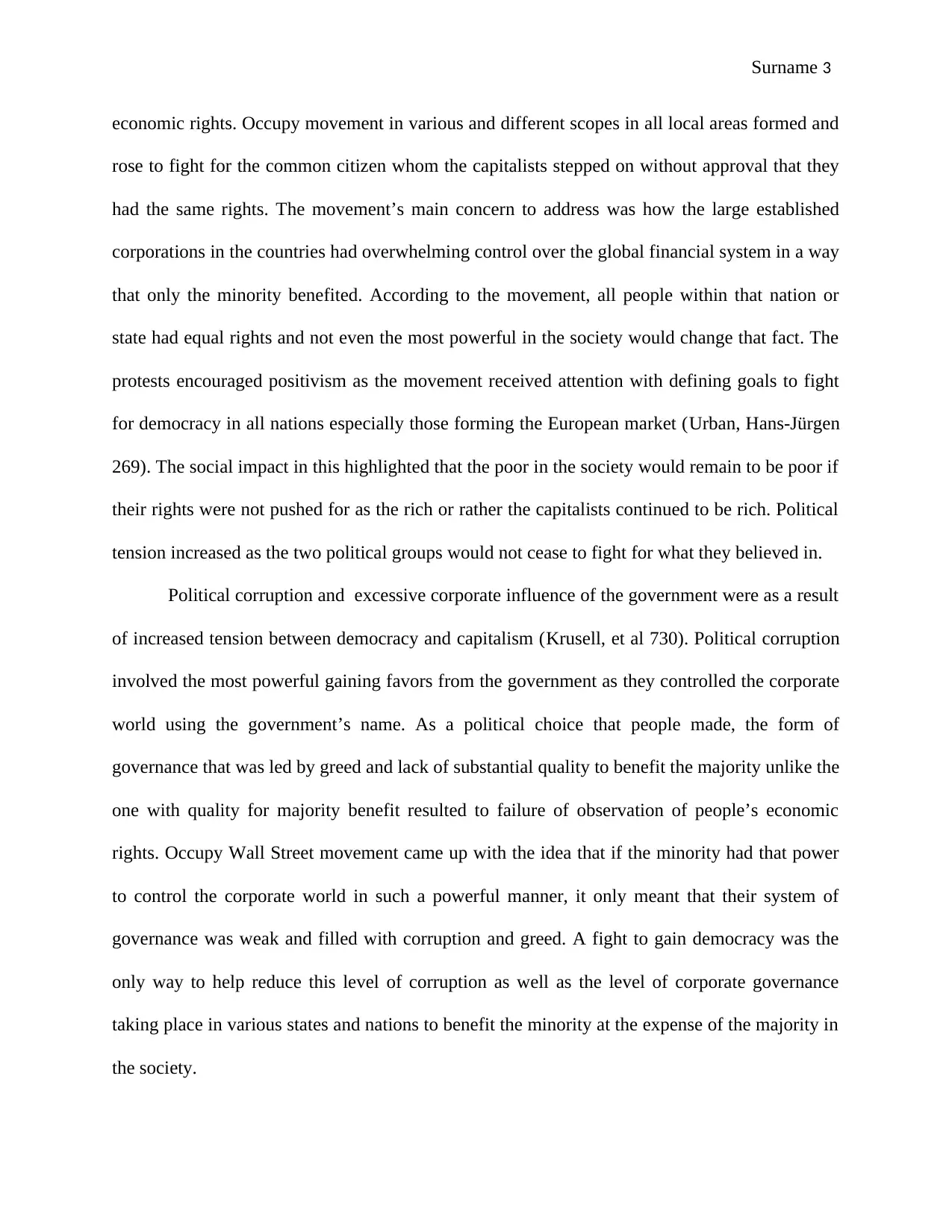
Surname 3
economic rights. Occupy movement in various and different scopes in all local areas formed and
rose to fight for the common citizen whom the capitalists stepped on without approval that they
had the same rights. The movement’s main concern to address was how the large established
corporations in the countries had overwhelming control over the global financial system in a way
that only the minority benefited. According to the movement, all people within that nation or
state had equal rights and not even the most powerful in the society would change that fact. The
protests encouraged positivism as the movement received attention with defining goals to fight
for democracy in all nations especially those forming the European market (Urban, Hans-Jürgen
269). The social impact in this highlighted that the poor in the society would remain to be poor if
their rights were not pushed for as the rich or rather the capitalists continued to be rich. Political
tension increased as the two political groups would not cease to fight for what they believed in.
Political corruption and excessive corporate influence of the government were as a result
of increased tension between democracy and capitalism (Krusell, et al 730). Political corruption
involved the most powerful gaining favors from the government as they controlled the corporate
world using the government’s name. As a political choice that people made, the form of
governance that was led by greed and lack of substantial quality to benefit the majority unlike the
one with quality for majority benefit resulted to failure of observation of people’s economic
rights. Occupy Wall Street movement came up with the idea that if the minority had that power
to control the corporate world in such a powerful manner, it only meant that their system of
governance was weak and filled with corruption and greed. A fight to gain democracy was the
only way to help reduce this level of corruption as well as the level of corporate governance
taking place in various states and nations to benefit the minority at the expense of the majority in
the society.
economic rights. Occupy movement in various and different scopes in all local areas formed and
rose to fight for the common citizen whom the capitalists stepped on without approval that they
had the same rights. The movement’s main concern to address was how the large established
corporations in the countries had overwhelming control over the global financial system in a way
that only the minority benefited. According to the movement, all people within that nation or
state had equal rights and not even the most powerful in the society would change that fact. The
protests encouraged positivism as the movement received attention with defining goals to fight
for democracy in all nations especially those forming the European market (Urban, Hans-Jürgen
269). The social impact in this highlighted that the poor in the society would remain to be poor if
their rights were not pushed for as the rich or rather the capitalists continued to be rich. Political
tension increased as the two political groups would not cease to fight for what they believed in.
Political corruption and excessive corporate influence of the government were as a result
of increased tension between democracy and capitalism (Krusell, et al 730). Political corruption
involved the most powerful gaining favors from the government as they controlled the corporate
world using the government’s name. As a political choice that people made, the form of
governance that was led by greed and lack of substantial quality to benefit the majority unlike the
one with quality for majority benefit resulted to failure of observation of people’s economic
rights. Occupy Wall Street movement came up with the idea that if the minority had that power
to control the corporate world in such a powerful manner, it only meant that their system of
governance was weak and filled with corruption and greed. A fight to gain democracy was the
only way to help reduce this level of corruption as well as the level of corporate governance
taking place in various states and nations to benefit the minority at the expense of the majority in
the society.
⊘ This is a preview!⊘
Do you want full access?
Subscribe today to unlock all pages.

Trusted by 1+ million students worldwide
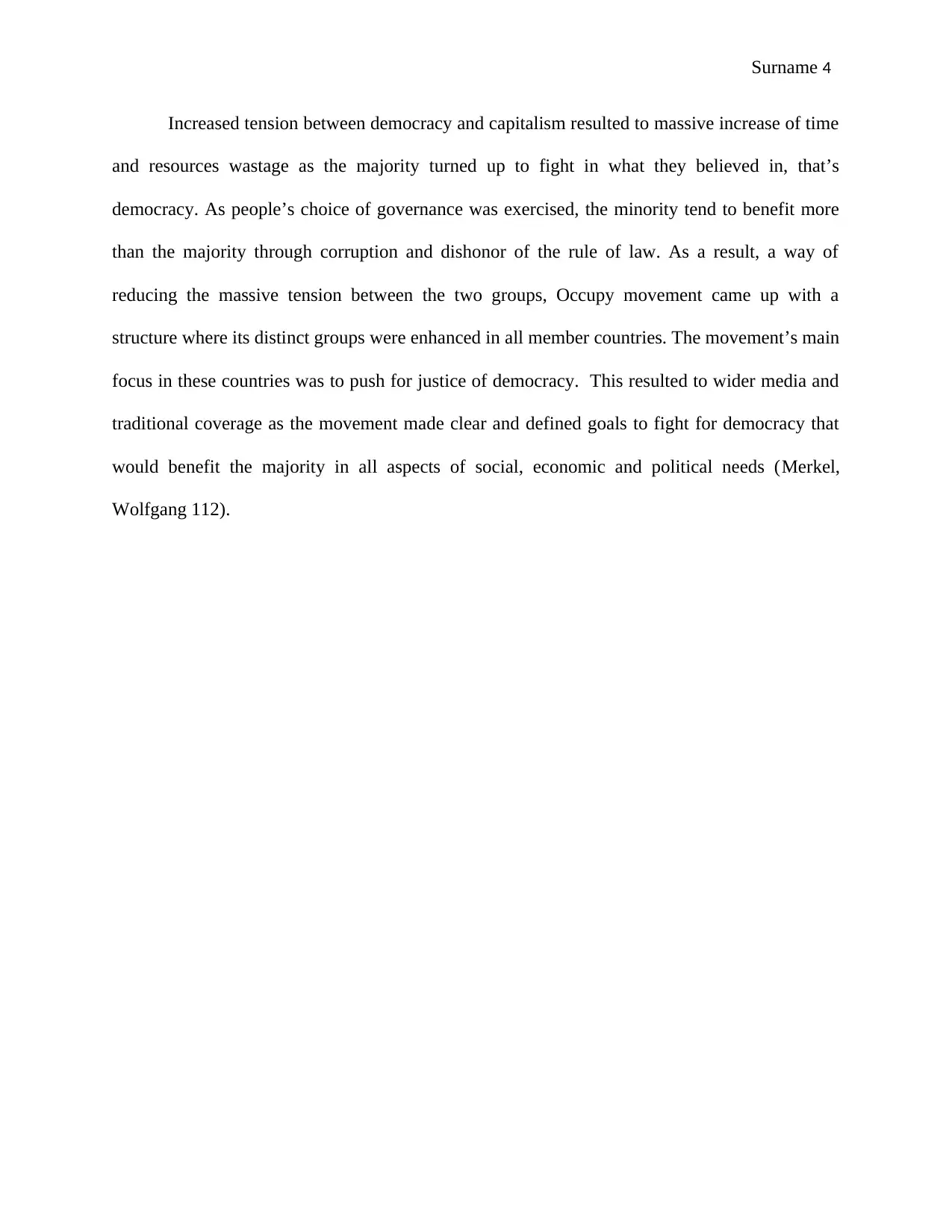
Surname 4
Increased tension between democracy and capitalism resulted to massive increase of time
and resources wastage as the majority turned up to fight in what they believed in, that’s
democracy. As people’s choice of governance was exercised, the minority tend to benefit more
than the majority through corruption and dishonor of the rule of law. As a result, a way of
reducing the massive tension between the two groups, Occupy movement came up with a
structure where its distinct groups were enhanced in all member countries. The movement’s main
focus in these countries was to push for justice of democracy. This resulted to wider media and
traditional coverage as the movement made clear and defined goals to fight for democracy that
would benefit the majority in all aspects of social, economic and political needs (Merkel,
Wolfgang 112).
Increased tension between democracy and capitalism resulted to massive increase of time
and resources wastage as the majority turned up to fight in what they believed in, that’s
democracy. As people’s choice of governance was exercised, the minority tend to benefit more
than the majority through corruption and dishonor of the rule of law. As a result, a way of
reducing the massive tension between the two groups, Occupy movement came up with a
structure where its distinct groups were enhanced in all member countries. The movement’s main
focus in these countries was to push for justice of democracy. This resulted to wider media and
traditional coverage as the movement made clear and defined goals to fight for democracy that
would benefit the majority in all aspects of social, economic and political needs (Merkel,
Wolfgang 112).
Paraphrase This Document
Need a fresh take? Get an instant paraphrase of this document with our AI Paraphraser
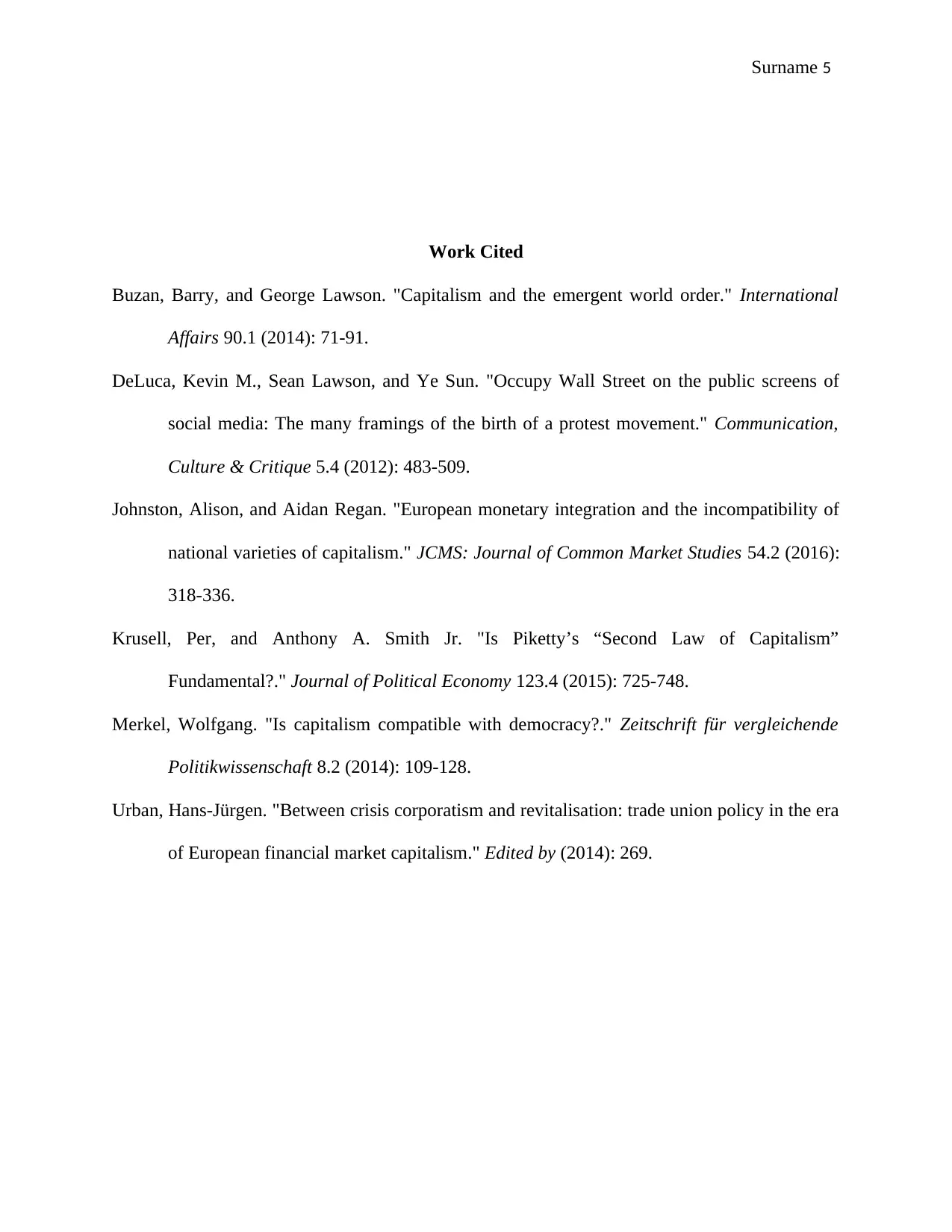
Surname 5
Work Cited
Buzan, Barry, and George Lawson. "Capitalism and the emergent world order." International
Affairs 90.1 (2014): 71-91.
DeLuca, Kevin M., Sean Lawson, and Ye Sun. "Occupy Wall Street on the public screens of
social media: The many framings of the birth of a protest movement." Communication,
Culture & Critique 5.4 (2012): 483-509.
Johnston, Alison, and Aidan Regan. "European monetary integration and the incompatibility of
national varieties of capitalism." JCMS: Journal of Common Market Studies 54.2 (2016):
318-336.
Krusell, Per, and Anthony A. Smith Jr. "Is Piketty’s “Second Law of Capitalism”
Fundamental?." Journal of Political Economy 123.4 (2015): 725-748.
Merkel, Wolfgang. "Is capitalism compatible with democracy?." Zeitschrift für vergleichende
Politikwissenschaft 8.2 (2014): 109-128.
Urban, Hans-Jürgen. "Between crisis corporatism and revitalisation: trade union policy in the era
of European financial market capitalism." Edited by (2014): 269.
Work Cited
Buzan, Barry, and George Lawson. "Capitalism and the emergent world order." International
Affairs 90.1 (2014): 71-91.
DeLuca, Kevin M., Sean Lawson, and Ye Sun. "Occupy Wall Street on the public screens of
social media: The many framings of the birth of a protest movement." Communication,
Culture & Critique 5.4 (2012): 483-509.
Johnston, Alison, and Aidan Regan. "European monetary integration and the incompatibility of
national varieties of capitalism." JCMS: Journal of Common Market Studies 54.2 (2016):
318-336.
Krusell, Per, and Anthony A. Smith Jr. "Is Piketty’s “Second Law of Capitalism”
Fundamental?." Journal of Political Economy 123.4 (2015): 725-748.
Merkel, Wolfgang. "Is capitalism compatible with democracy?." Zeitschrift für vergleichende
Politikwissenschaft 8.2 (2014): 109-128.
Urban, Hans-Jürgen. "Between crisis corporatism and revitalisation: trade union policy in the era
of European financial market capitalism." Edited by (2014): 269.
1 out of 5
Related Documents
Your All-in-One AI-Powered Toolkit for Academic Success.
+13062052269
info@desklib.com
Available 24*7 on WhatsApp / Email
![[object Object]](/_next/static/media/star-bottom.7253800d.svg)
Unlock your academic potential
Copyright © 2020–2026 A2Z Services. All Rights Reserved. Developed and managed by ZUCOL.





